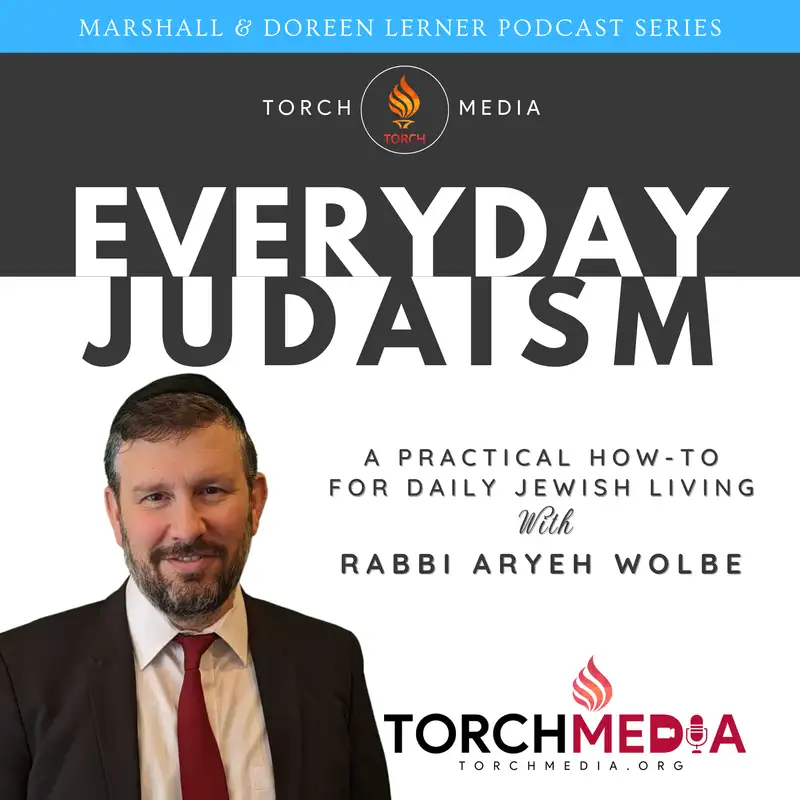Ep. 64 - The Laws of Kaddish - Part 3 (Siman 26)
In this episode of the Everyday Judaism Podcast, Rabbi Aryeh Wolbe concludes the discussion of Siman 26 of the Kitzur Shulchan Aruch, covering halachot 14–22 of the mourner’s Kaddish, completing the first book of the Kitzur Shulchan Aruch. He emphasizes the spiritual significance of Kaddish in elevating the deceased’s soul by declaring Hashem’s oneness, while noting that modern practice of all mourners reciting Kaddish together reduces the relevance of precedence rules but underscores communal unity. Key points include:
- Recap of Kaddish’s Purpose: Kaddish, recited by descendants, elevates the deceased’s soul, as per Midrashic stories, by glorifying Hashem’s name. The mourning stages—shiva (7 days, most intense), shloshim (30 days), the first year, and yahrtzeit (annual anniversary)—dictate Kaddish priorities, with shiva mourners taking precedence.
- Halacha 14–15 (Chazan Priorities): Leading prayers as chazan provides greater merit for the deceased than Kaddish alone, originally instituted for minors unable to lead. Shiva or shloshim mourners have precedence in leading services, except on Shabbos/Yom Tov unless they were the regular chazan. If two equally entitled mourners are capable chazans, they cast lots, splitting the service (one leads until Ashrei, the other from Ashrei onward). A chazan doesn’t forfeit Kaddish rights but should yield to minors or less capable mourners.
- Halacha 16–18 (Multiple Mourners): Mourning for both parents on the same day doesn’t grant extra Kaddish rights; one Kaddish covers both. Kaddish is recited for 11 months, not 12, to avoid implying the deceased was a great sinner (judged for 12 months in Gehenna). Counting starts from burial, not death, with adjustments for leap years (e.g., stopping on the 9th of Kislev). Rabbi Wolbe shares his grandfather’s request for 12-month Kaddish, approved by Rabbi Elyashiv, reflecting humility, and notes his grandfather’s rejection of eulogies to avoid exaggerated claims, as eulogies are scrutinized in heaven.
- Halacha 19–21 (Community and Women): If no parental mourners are present, someone who previously lost parents recites Kaddish for all deceased Jews. Other relatives (e.g., grandparents, siblings without children) may recite Kaddish if permitted by parental mourners. Women typically don’t recite Kaddish in synagogue but can do so in a home minyan, ideally with others. A yahrtzeit observer unable to recite Kaddish (e.g., while traveling) can recite it at the next Ma’ariv, as Rabbi Wolbe illustrates with an email about arranging a minyan in Galveston for a cruise passenger’s yahrtzeit.
- Halacha 22 (Greatest Merit): The greatest merit for parents is not just Kaddish but children living Torah-observant lives daily, honoring parents posthumously (per the Zohar, citing Exodus 20:12). Rabbi Wolbe emphasizes actions like keeping kosher or Shabbos as greater than Kaddish, sharing a story of a bumper sticker (“good” above grass, “bad” below) to highlight the opportunity to do good while alive for ancestors’ merit.
- Community and Sensitivity: Rabbi Wolbe stresses avoiding disputes over Kaddish precedence, as fights dishonor the deceased. He praises communal efforts, like arranging minyans for travelers, and reflects on the psychological benefits of shiva for healing, noting the custom of walking around the block post-shiva to reenter life.
_____________
The Everyday Judaism Podcast is dedicated to learning, understanding and appreciating the greatness of Jewish heritage and the Torah through the simplified, concise study of Halacha, Jewish Law, thereby enhancing our understanding of how Hashem wants us to live our daily lives in a Jewish way.
_____________
This Podcast Series is Generously Underwritten by Marshall & Doreen Lerner
The Everyday Judaism Podcast is dedicated to learning, understanding and appreciating the greatness of Jewish heritage and the Torah through the simplified, concise study of Halacha, Jewish Law, thereby enhancing our understanding of how Hashem wants us to live our daily lives in a Jewish way.
_____________
This Podcast Series is Generously Underwritten by Marshall & Doreen Lerner
- Download & Print the Everyday Judaism Halacha Notes:
https://drive.google.com/drive/folders/1RL-PideM42B_LFn6pbrk8MMU5-zqlLG5
This episode (Ep. #63) of the Everyday Judaism Podcast by Rabbi Aryeh Wolbe of TORCH is dedicated to my dearest friends, Marshall & Doreen Lerner! May Hashem bless you and always lovingly accept your prayer for good health, success and true happiness!!!
Recorded in the TORCH Centre - Levin Family Studio (B) to a live audience on September 14, 2025, in Houston, Texas.
Released as Podcast on October 9, 2025
_____________
DONATE to TORCH: Please consider supporting the podcasts by making a donation to help fund our Jewish outreach and educational efforts at https://www.torchweb.org/support.php. Thank you!
_____________
SUBSCRIBE and LISTEN to other podcasts by Rabbi Aryeh Wolbe:
- NEW!! Prayer Podcast: https://prayerpodcast.transistor.fm/episodes
- Jewish Inspiration Podcast: https://inspiration.transistor.fm/episodes
- Parsha Review Podcast: https://parsha.transistor.fm/episodes
- Living Jewishly Podcast: https://jewishly.transistor.fm/episodes
- Thinking Talmudist Podcast: https://talmud.transistor.fm/episodes
- Unboxing Judaism Podcast: https://unboxing.transistor.fm/episodes
- Rabbi Aryeh Wolbe Podcast Collection: https://collection.transistor.fm/episodes
For a full listing of podcasts available by TORCH at https://www.TORCHpodcasts.com
Please visit www.torchweb.org to see a full listing of our outreach and educational resources available in the Greater Houston area!
_____________
#Halacha, #Jewishlaw, #Mourning, #Kaddish, #Mourner, #Shiva, #Yartzeit, #Condolences, #Grief, #Sensitivities, #etiquette
★ Support this podcast ★
_____________
#Halacha, #Jewishlaw, #Mourning, #Kaddish, #Mourner, #Shiva, #Yartzeit, #Condolences, #Grief, #Sensitivities, #etiquette
